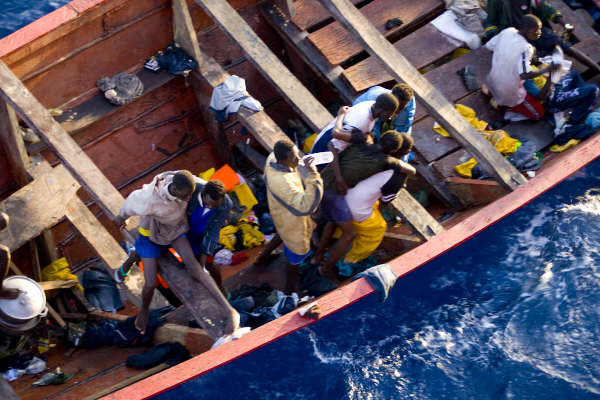The Smuggling of Migrants Protocol supplementing the United Nations Convention against Transnational Organized Crime defines the smuggling of migrants as the
"procurement, in order to obtain, directly or indirectly, a
financial or other material benefit, of the illegal entry of a person
into a State Party of which the person is not a national or a permanent
resident."
(Article 3,
Smuggling of Migrants Protocol).
In order to comply with the
Smuggling of Migrants Protocol,
Article 6 requires states to criminalize both smuggling of migrants and
enabling of a person to remain in a country illegally, as well as
aggravating circumstances that endanger lives or safety, or entail
inhuman or degrading treatment of migrants.
Virtually every country in the world is
affected by this crime, whether as an origin, transit or destination
country for smuggled migrants by profit-seeking criminals. Smuggled
migrants are vulnerable to life-threatening risks and exploitation;
thousands of people have suffocated in containers, perished in deserts
or dehydrated at sea.
Generating huge profits for the criminals
involved, migrant smuggling fuels corruption and empowers organized
crime.
Learn more about the crime of migrant smuggling
here .
Migrant Smuggling - a deadly business
Currently, data is too scattered and incomplete to paint an accurate picture of numbers of people who are smuggled each year and the routes and methods used by those who smuggle them. Still, available evidence reveals the following trends and patterns:- Criminals are increasingly providing smuggling services to irregular migrants to evade national border controls, migration regulations and visa requirements. Most irregular migrants resort to the assistance of profit-seeking smugglers. As border controls have improved, migrants are deterred from attempting to illegally cross them themselves and are diverted into the hands of smugglers.
- Migrant smuggling is a highly profitable business in which criminals enjoy low risk of detection and punishment. As a result, the crime is becoming increasingly attractive to criminals. Migrant smugglers are becoming more and more organized, establishing professional networks that transcend borders and regions.
- The modus operandi of migrant smugglers is diverse. Highly sophisticated and expensive services rely on document fraud or 'visa-smuggling'. Contrasted with these are low cost methods which often pose high risks for migrants, and have lead to a dramatic increase in loss of life in recent years.
- Migrant smugglers constantly change routes and modus operandi in response to changed circumstances often at the expense of the safety of the smuggled migrants.
- Thousands of people have lost their lives as a result of the indifferent or even deliberate actions of migrant smugglers.
These factors highlight the need for
responses to combat the crime of migrant smuggling to be coordinated
across and between regions, and adaptable to new methods.
In this
regard, UNODC seeks to assist countries in implementing the
Smuggling of Migrants Protocol while promoting a comprehesensive response to the issue of migrant smuggling.


Δεν υπάρχουν σχόλια:
Δημοσίευση σχολίου
Σημείωση: Μόνο ένα μέλος αυτού του ιστολογίου μπορεί να αναρτήσει σχόλιο.